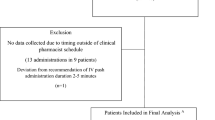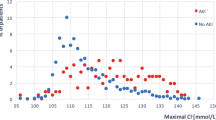Abstract
Introduction
Desmopressin improves hemostasis through the release of factor VIII, von Willebrand factor, and tissue plasminogen activator, and increases platelet adhesion. Neurocritical Care guidelines recommend consideration of desmopressin in antiplatelet-associated intracranial hemorrhage. Studies supporting its use have not evaluated the potential impact of desmopressin on serum sodium levels in patients receiving hypertonic saline therapy. The purpose of this study was to assess the impact of desmopressin on sodium levels and hypertonic saline effectiveness in intracranial hemorrhage.
Methods
This was a single center retrospective observational chart review. Patients were included in the desmopressin group if they were diagnosed with intracranial hemorrhage, administered desmopressin, and received hypertonic saline infusion. Patients in the hypertonic saline alone group were then matched 1:1 to the patients in the desmopressin group. The primary end point was the effect of desmopressin on reaching a sodium goal of 145–155 mEq/L. The secondary end points included intensive care unit and hospital length of stay, change in sodium, time to reach sodium goal, thrombotic events, mortality, and a composite of increased cerebral edema, hematoma expansion, midline shift, herniation, need for neurosurgical intervention, and neurologic decompensation.
Results
Of 112 patients screened, 25 patients met inclusion criteria for the desmopressin group, and 25 patients were matched with patients in the hypertonic saline alone group. The percentage of patients who reached goal sodium in the desmopressin group compared with hypertonic saline alone was similar (80% vs. 88%, respectively). There were no differences in the secondary end points. In the subgroup analysis, patients in the hypertonic saline group met the predefined sodium goal of 150–155 mEq/L within 48 h more often than those in the desmopressin group (82% vs. 60%, respectively, p = 0.042).
Conclusions
The use of desmopressin in intracranial hemorrhage does not appear to negatively impact the ability for patients to reach goal sodium of 145–155 mEq/L. However, in patients with higher sodium goals, desmopressin may decrease hypertonic saline effectiveness.


Similar content being viewed by others
References
Chan S, Hemphill JC. Critical care management of intracerebral hemorrhage. Crit Care Clin. 2014;30(4):699–717.
Hemphill JC, Greenberg SM, Anderson CS, et al. Guidelines for the management of spontaneous intracerebral hemorrhage: a guideline for healthcare professionals from the american heart association/american stroke association. Stroke. 2015;46(7):2032–60.
Naidech AM, Jovanovic B, Liebling S, et al. Reduced platelet activity is associated with early clot growth and worse 3-month outcome after intracerebral hemorrhage. Stroke. 2009;40(7):2398–401.
Caso V, Paciaroni M, Venti M, et al. Effect of on-admission antiplatelet treatment on patients with cerebral hemorrhage. Cerebrovasc Dis. 2007;24(2–3):215–8.
Creutzfeldt CJ, Weinstein JR, Longstreth WT, Becker KJ, Mcpharlin TO, Tirschwell DL. Prior antiplatelet therapy, platelet infusion therapy, and outcome after intracerebral hemorrhage. J Stroke Cerebrovasc Dis. 2009;18(3):221–8.
Frontera JA, Lewin JJ, Rabinstein AA, et al. Guideline for reversal of antithrombotics in intracranial hemorrhage: executive summary: a statement for healthcare professionals from the neurocritical care society and the society of critical care medicine. Crit Care Med. 2016;44(12):2251–7.
Franchini M, Lippi G. The use of desmopressin in acquired haemophilia A: a systematic review. Blood Transfus. 2011;9(4):377–82.
Balasubramanian L, Boggio L, Foiles N, et al. Effectiveness of DDAVP in Von Willebrand’s Disease. Blood. 2004;104(11):4031.
Hedges SJ, Dehoney SB, Hooper JS, Amanzadeh J, Busti AJ. Evidence-based treatment recommendations for uremic bleeding. Nat Clin Pract Nephrol. 2007;3(3):138–53.
Huang WY, Saver JL, Wu YL, Lin CJ, Lee M, Ovbiagele B. Frequency of intracranial hemorrhage with low-dose aspirin in individuals without symptomatic cardiovascular disease: a systematic review and meta-analysis. JAMA Neurol. 2019;76(8):906–14.
Frontera JA, Lewin JJ, Rabinstein AA, et al. Guideline for reversal of antithrombotics in intracranial hemorrhage: a statement for healthcare professionals from the neurocritical care society and society of critical care medicine. Neurocrit Care. 2016;24(1):6–46.
Wagner I, Hauer EM, Staykov D, et al. Effects of continuous hypertonic saline infusion on perihemorrhagic edema evolution. Stroke. 2011;42(6):1540–5.
Juul KV, Bichet DG, Nørgaard JP. Desmopressin duration of antidiuretic action in patients with central diabetes insipidus. Endocrine. 2011;40(1):67–74.
Kuramatsu JB, Bobinger T, Volbers B, et al. Hyponatremia is an independent predictor of in-hospital mortality in spontaneous intracerebral hemorrhage. Stroke. 2014;45(5):1285–91.
Ozgönenel B, Rajpurkar M, Lusher JM. How do you treat bleeding disorders with desmopressin? Postgrad Med J. 2007;83(977):159–63.
Kim DY, O’leary M, Nguyen A, et al. The effect of platelet and desmopressin administration on early radiographic progression of traumatic intracranial hemorrhage. J Neurotrauma. 2015;32(22):1815–21.
Kapapa T, Röhrer S, Struve S, et al. Desmopressin acetate in intracranial haemorrhage. Neurol Res Int. 2014;2014:298767.
Harrois A, Anstey JR, Taccone FS, et al. Serum sodium and intracranial pressure changes after desmopressin therapy in severe traumatic brain injury patients: a multi-centre cohort study. Ann Intensive Care. 2019;9(1):99.
Feldman EA, Meola G, Zyck S, et al. Retrospective assessment of desmopressin effectiveness and safety in patients with antiplatelet-associated intracranial hemorrhage. Crit Care Med. 2019;47(12):1759–65.
Naidech AM, Maas MB, Levasseur-franklin KE, et al. Desmopressin improves platelet activity in acute intracerebral hemorrhage. Stroke. 2014;45(8):2451–3.
Funding
No funding was received for this project. This research was supported (in whole or in part) by HCA Healthcare and/or an HCA Healthcare affiliated entity. The views expressed in this publication represent those of the author(s) and do not necessarily represent the official views of HCA Healthcare or any of its affiliated entities.
Author information
Authors and Affiliations
Contributions
All authors made substantial contributions to the conception and design, acquisition of data, or analysis and interpretation of data, drafting the article and revising it critically for important intellectual content, and approve of the final version to be published.
Corresponding author
Ethics declarations
Conflicts of Interest
The authors have no conflicts of interest to disclose.
Ethical approval/informed consent
The study adhered to all ethical guidelines and due to its retrospective nature did not require the use of informed consent. A statement of IRB approval is provided as a supplemental material.
Additional information
Publisher's Note
Springer Nature remains neutral with regard to jurisdictional claims in published maps and institutional affiliations.
Rights and permissions
About this article
Cite this article
Bowers, E., Shaw, E., Bromberg, W. et al. Desmopressin Administration and Impact on Hypertonic Saline Effectiveness in Intracranial Hemorrhage. Neurocrit Care 36, 164–170 (2022). https://doi.org/10.1007/s12028-021-01277-2
Received:
Accepted:
Published:
Issue Date:
DOI: https://doi.org/10.1007/s12028-021-01277-2




